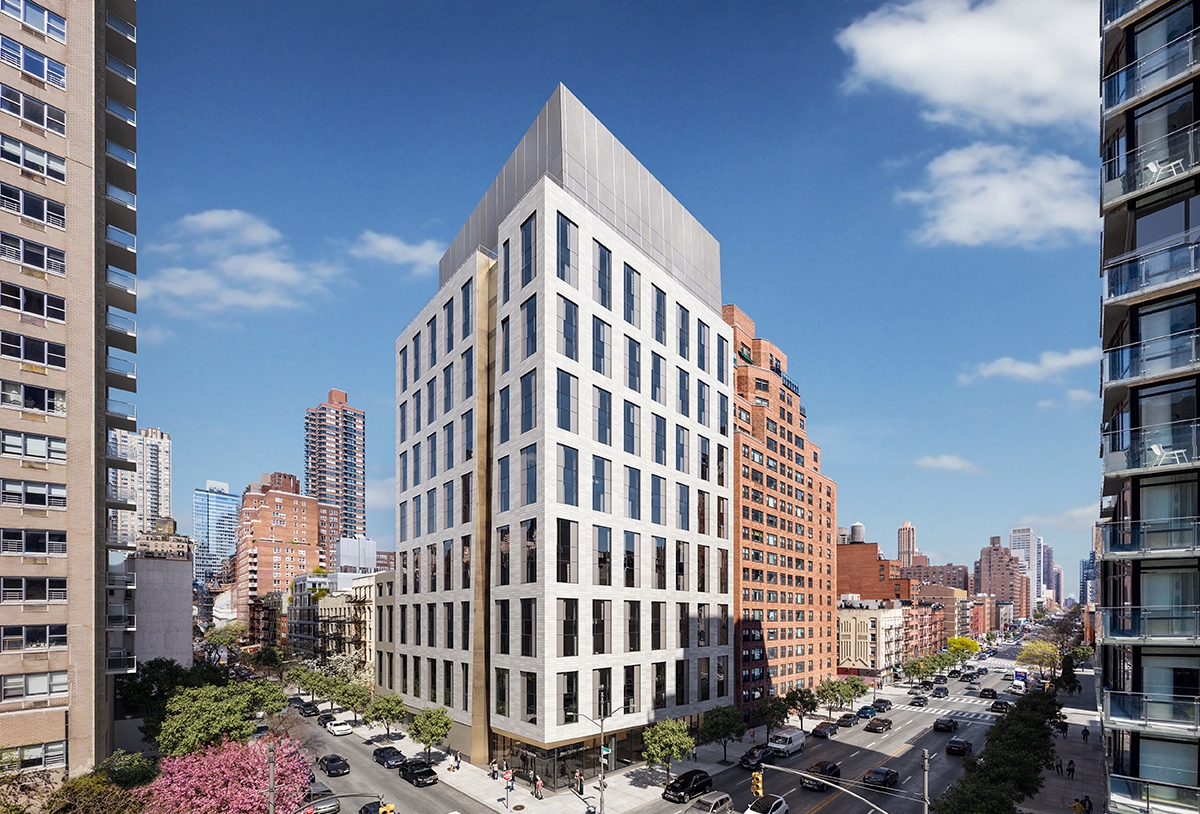NEW YORK (Oct. 17, 2023)—Weill Cornell Medicine is constructing a modern new student residence that, when it opens in 2025, will expand the scope of the institution’s Upper East Side campus and nearly double the existing student residential living space.
The new $260 million, 16-story, 173,000-square-foot residence is located on the northwest corner of East 74th Street and York Avenue, four blocks from Weill Cornell Medicine’s existing campus of clinical, research and educational buildings. The light-filled and eco-friendly building will house 272 students and feature 163 studios, seven one-bedrooms and 51 two-bedroom apartments, all equipped with a full kitchen. The residence hall will also include several spaces for study, collaboration, recreation, fitness and socialization.
“We're building what will be one of the best student residences anywhere in this country,” said Dr. Robert A. Harrington, the Stephen and Suzanne Weiss Dean of Weill Cornell Medicine and provost for medical affairs of Cornell University. “Importantly, this new residence will both support our students’ academic life here and instill a lifelong emphasis on taking care of their overall wellness. The future of Weill Cornell Medicine is bright.”
“For more than a century, Weill Cornell Medicine has prided itself on producing exemplary doctors and researchers who have transformed our understanding and practice of medicine,” said Cornell President Martha E. Pollack. “This new residence will further enrich the experience of our students, providing them with the best possible living and learning environments as they pursue their educations at Weill Cornell Medicine.”

External rendering of Weill Cornell Medicine's new student residence. Credit Perkins and Will.
The residence hall is made possible by the extraordinary generosity of Weill Cornell Medicine’s donors—including significant gifts from We’re Changing Medicine campaign co-chairs Jeffrey Feil and Sanford I. Weill and their families, other long-time donors and the institution’s alumni—who collectively contributed $122 million toward its construction.
The building is a centerpiece of Weill Cornell Medicine’s suite of initiatives to enhance the student experience. To help more students realize their educational aspirations, Weill Cornell Medicine in 2019 expanded its scholarship program to eliminate educational debt for medical students who qualify for financial aid. That same year, the institution opened the Feil Family Student Center, a 16,200-square-foot campus space that expanded facilities for classes, meetings, quiet study and informal gatherings.
“With the We’re Changing Medicine campaign, we’re transforming the entire student experience – and the new student residence is a key component of our vision for the future,” said Weill Cornell Medicine Board of Fellows Chair Jessica M. Bibliowicz. “This is an enormous undertaking, and we are grateful to our campaign co-chairs Jeffrey Feil and Sandy Weill, as well as our dedicated donors. Their investment in the wellness of our future doctors and scientists will change patients’ lives.”
The student residence, designed by Rob Goodwin, Cornell B.Arch. ’84, of Perkins and Will, will help graduate and medical students balance personal health and rigorous education by providing a modern living space that offers ways to encounter and collaborate with their peers. The building will also feature various communal spaces such as study nooks, meeting rooms, a fitness center, yoga and music rooms, a student lounge with access to an outdoor garden, a multipurpose activity court and a rooftop lounge with an adjoining terrace. Weill Cornell Medicine's Board of Fellows, working closely with current students, conceptualized the building to ensure that its amenities and design would fulfill students’ needs.
The building is designed to infuse its spaces with natural light and emphasize the visual and physical connection to the rest of the main campus, directly to the south. One of its main architectural features is a recess, or vertical expression, that will span the length of the building along the southern facade to reinforce the connection of the ground to the roof and open the residential elevator lobbies to direct sunlight. In addition, all apartments will feature at least one large window, with one- and two-bedroom units strategically located at the building corners for two exposures.
The student residence will also serve as an archetype for green construction. The energy-efficient building will be free of fossil fuels, utilizing an all-electric heating, ventilation and air conditioning technology called air-cooled air source heat pumps that both heat and cool. An air-cooled refrigerant unit with energy recovery will provide outside air ventilation. The building will also boast efficient water and lighting fixtures for conservation. Weill Cornell Medicine will seek LEED (Leadership in Energy and Environmental Design) Gold certification, the nationally accepted benchmark for the design, construction and operation of high-performance green buildings, for the student residence.
Weill Cornell Medicine
Weill Cornell Medicine is committed to excellence in patient care, scientific discovery and the education of future physicians in New York City and around the world. The doctors and scientists of Weill Cornell Medicine—faculty from Weill Cornell Medical College, Weill Cornell Graduate School of Medical Sciences, and Weill Cornell Physician Organization—are engaged in world-class clinical care and cutting-edge research that connect patients to the latest treatment innovations and prevention strategies. Located in the heart of the Upper East Side’s scientific corridor, Weill Cornell Medicine’s powerful network of collaborators extends to its parent university Cornell University; to Qatar, where Weill Cornell Medicine-Qatar offers a Cornell University medical degree; and to programs in Tanzania, Haiti, Brazil, Austria and Turkey. Weill Cornell Medicine faculty provide exemplary patient care at NewYork-Presbyterian/Weill Cornell Medical Center, NewYork-Presbyterian Westchester Behavioral Health Center, NewYork-Presbyterian Lower Manhattan Hospital, NewYork-Presbyterian Queens and NewYork-Presbyterian Brooklyn Methodist Hospital. Weill Cornell Medicine is also affiliated with Houston Methodist. For more information, visit weill.cornell.edu.
